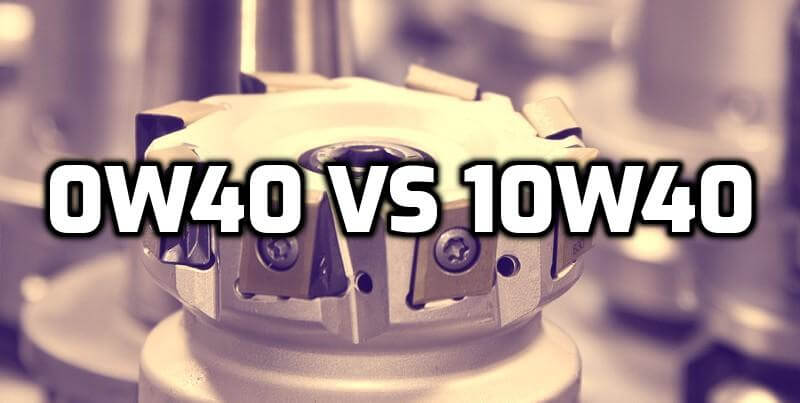0W40 Vs 10W40 Motor Oil


Do you know that there are several types of motor oil specially designed for different uses? If not, then this blog post is just the place to learn about 0W40 and 10W40 motor oils. We’ll assess their advantages over one another, and discuss when it’s appropriate to use each type of oil, so if you’re uncertain which kind suits your car best – look no further!
0W40 Vs 10W40 Table
We will discuss the differences between these two types of oil and help you decide which is suitable for your car.
0W40 | 10W40 |
Pennzoil Ultra Platinum | Castrol 03111C GTX |
Viscosity index is 185 | Viscosity index is 150 |
Better fuel economy on average an extra 550 miles per year | Superior oil burn off protection then other oil in the industries |
Keeps pistons up to 45% cleaner than other | Superior detergency that helps prevent deposit build up |
Excellent wear protection from friction | Advanced additives that help prevent engine wear |
Provide faster low-temperature oil flow | Has Seal conditioners which help to reduce leaks |
Helps protect engines from loss of power | Helps to improved fuel economy |
Specially designed for engines over 75,000 miles | It meets or exceeds the following OEM requirements |
Why Compare?
Both 0W40 and 10W40 Motor Oil have their specific purposes. So, it is essential to know when to use each type of oil. 0W40 is a synthetic motor oil that is designed for high-performance vehicles. It has a low viscosity, which flows quickly and easily in cold weather. This makes it an ideal choice for cars driven in cold climates.
On the other hand, 10W40 is a conventional motor oil designed for all vehicles. It has a higher viscosity, which flows more slowly and is thicker than 0W40. This makes it a good choice for cars driven in warm climates.
The main difference between 0W40 and 10W40 is that 0W40 is designed for high-performance cars driven in cold climates. In contrast, 10W40 is designed for all vehicles driven in warm temperatures.
Viscosity Grade
The viscosity of motor oil refers to its flowability, which can be thick or thin, broad in a bottle of jam, and light in the context of a beer bottle.
The number preceding the alphabet W denotes the amount or weight of viscosity at low temperatures; the greater the number, the thicker it is; the lower the number, the thinner it is.
For 0W40, the combination of numbers and letters indicates that the viscosity (0W) is low, implying thin rather than thick. The 40 in 0W40 suggests that the motor oil’s thickness must fall within particular limits at 100°C. It’s a multigrade motor oil based on the face look of the motor oil numbers, letters, and grading.
On the other hand, for 10W40, it is very much visible that the viscosity of this oil is higher than 0W40. However, 10W40 oil is thick, and the 40 in the 10W40 means the oil will drop to a specific viscosity limit at 100°C.
Fuel Economy
Motor oil plays a vital role in fuel consumption in a car. Researches show that synthetic motor oils are better than mineral motor oil cause synthetic oil consumes less fuel. Both 10W40 and 0W40 oils are synthetic oil. Still, variables determine which one is more economical in fuel consumption.
Generally, the oil with less viscosity or thin oil is more fuel economical. Considering the theory, 10W40 is more viscous than 0W40 synthetic oil. In simple words, 0W40 is the thinner oil between these two oils. That means 0W40 oil tends to be more economical in fuel consumption.
Oil Breakdown
Sludge is the biggest adversary of modern engines, reducing vehicle life dramatically. Sludge is formed when external molecules — water, soot, tiny debris from engine internal component wear, and oil breakdown – combine with the oil.
The oil that has been broken down is thicker, resulting in higher engine drag, decreased fuel economy, and irreversible damage to essential components. Sludge can accumulate in the oil channels, clogging them and leaving the overhead camshafts dry. As a result, the engine dies quickly.
10W40 oils are known to degrade faster than other oils. This is because 10W40 oil has more viscosity indices due to a more significant base and peak viscosity variation. Synthetic polymers known as Viscosity Index Improvers (VIIs) are added to the base oil To ensure that the viscosity changes uniformly with each cold crank of the engine.
Unless an engine is intended to handle thinner, lighter oil, a lower-weight oil like 0W40 may not have a higher fuel economy. Modern gasoline engines run on 0-weight oil and are incredibly efficient. On the other hand, thinner oil machines have significantly tighter tolerances. They are more prone to breaking down if the owner does not keep up with oil changes.
Conclusion
There is no clear-cut answer, as both 0W40 and 10W50 motor oils have their benefits and drawbacks. 0W40 is thinner and less dense than 10W50, making it a better choice for high-performance cars driven in cold climates.
However, 10W50 is better suited for all vehicles driven in warm temperatures. So, which type of oil should you use? The answer depends on the climate you live in and the vehicle you drive.
Related Article


